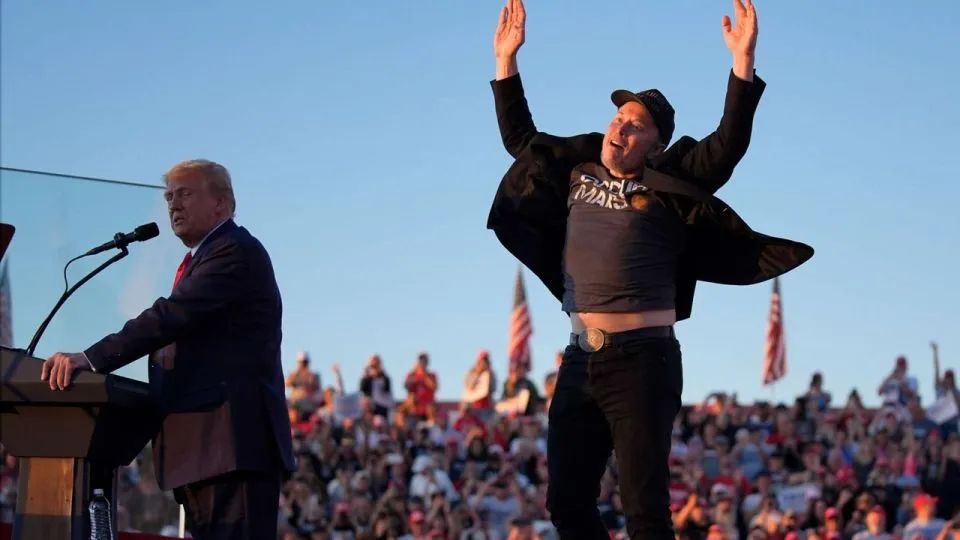
If you ask what is different about this US election from previous ones, the always eloquent former President Trump might express his dissatisfaction, such as the temporary change of leadership of his rival, the loss of campaign funds, and the assassination attempt on him. But if you ask him who he wants to thank the most in this election, Musk will definitely be one of Trump's answers.
In this year's election, Musk unexpectedly stood firmly on Trump's side. Not only did he spend $75 million in campaign funds in the third quarter to show his determination, he also vigorously campaigned on public platforms. Recently, he even launched a lottery draw project to mobilize public support. Whether in terms of manpower or funds, Musk's efforts can be described as doing his best.
For an extremely influential and controversial entrepreneur, it is not a wise move to take such a clear stand. In a general election where the outcome is unknown, if one is not careful, the party's ship will be overturned, and the loser will not only face political failure, but also risk personal safety.
Back to a few years ago, Musk and Trump were not close friends, and their verbal battles were often staged on public platforms. Trump even mocked Musk for kneeling down in the White House to beg for subsidies. What could have made Musk put aside his past grudges and help so wholeheartedly?
Amid the precarious election situation, the trade of money and power is also proceeding secretly.
01. With the momentum, Musk spent a lot of money on Trump
Not long ago, Trump said in a speech: "I called Elon and he gave me the best support." Musk's support is naturally extraordinary to be so thankful by the presidential candidate.
In terms of hard financial support, since he made his clear choice in July, it is not an exaggeration to describe Musk as a lavish spender. According to data disclosed by the Federal Commission, in the third quarter, Musk donated $75 million to the America PAC, which supports Trump. Although this amount was expected by the market and was even slightly lower than the previous forecast of $45 million per month. But judging from the total amount alone, Musk has become the largest donor besides Adelson, a staunch supporter of Trump and heir to the casino fortune (who donated $95 million).
From the financial perspective alone, Musk's help is a timely help. In this election, Trump has been struggling to raise funds for a long time.
Judging from the data, the Democratic Party has maintained its consistent dominant position this year, and even due to the change of leadership in the middle of the campaign, fundraising has become more focused. Since becoming the leader of the Democratic Party at the end of July, Harris has raised $1 billion. In the third quarter alone, Harris's fundraising committee raised $633 million, four times the amount raised by Trump's similar fundraising department in the same period.
Although Trump did not show it on the surface, he was very dissatisfied behind the scenes. According to the New York Times, at a donor dinner in September, Trump said that he needed donors and others to do more, appreciate and help him more. At this dinner, it was clear what he meant. As for fundraising, Trump personally tried his best. He had to sell tickets to attend the conference and raise funds for crypto projects. He had to open up all kinds of channels and put pressure on supporters. In April, Trump threatened to let large oil and gas companies raise $1 billion for him. In July, Trump even sent a text message to his number one supporter Adelson asking him to donate $250 million.
But for the election, money is only the most intuitive factor. Money is important, but a large amount of money does not mean victory. In addition to money, the "help" provided by Musk should not be underestimated.
First of all, Musk, who has 200 million fans, is extremely well-known, and controls the large public opinion platform X, is already inflammatory just by announcing his support. In August, Musk took the lead and held an exclusive Space interview to speak out for Trump, with millions of people online firing the first shot of the campaign. Trump also took the opportunity to reconcile with the X platform and continue to carry forward his usual public propaganda policy. Since then, the relationship between the two has become closer, and their public propaganda has been very tacit.
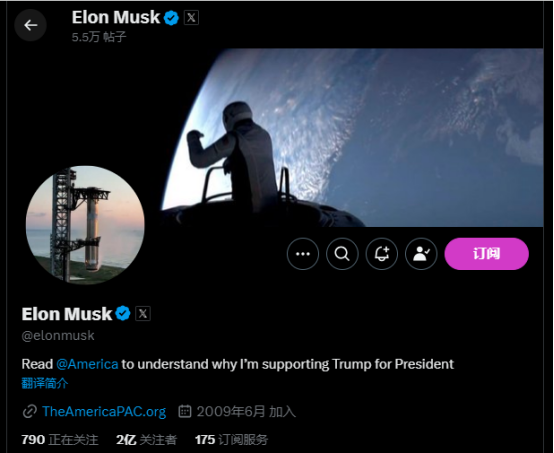
Musk's X platform has 200 million followers, source: X
In October, Trump returned to Butler, Pennsylvania and held a campaign rally. Musk was invited to accompany him. He wore a MEGA on his head, exposed his body on the stage to support him, and gave a speech praising Trump's masculinity, which seemed to be a sign of prosperity for both sides.
Just a few days ago, Musk made another big move, randomly selecting a voter who participated in the petition in Pennsylvania every day and giving him a million dollars for free. The petition was launched online by the "American Political Action Committee" created by Musk, calling for support for freedom of speech and gun rights. According to the rules, from October 19th until the presidential election voting day on November 5th, any voter who signed and participated in the petition in the seven key "swing states" of Pennsylvania, Arizona, Georgia, Michigan, Nevada, North Carolina and Wisconsin will have one chance to win $1 million every day; the "lottery" eligibility for the first three days is limited to Pennsylvania voters, and voters in the seven states are eligible after that.
Previously, Musk had launched a campaign for Pennsylvania voters, offering $100 for joining the petition and another $100 for recommending one person, while the offer for other swing states was $47. Not only did he attract new members, but he also created a lot of new ones. It is hard not to sigh that Musk is well versed in Internet operations. Although it seems to be just a petition campaign to defend the right to support freedom of speech and the right to bear arms, it is clear that this campaign is intended to attract supporters of pro-Trump speech, and the purpose is still to vote for Trump.
Needless to say, buying tickets with money poses compliance risks in any country. Even if it is packaged in the form of a lottery, the plan issued to voters is obviously suspected of violating the ban. Pennsylvania Governor Josh Shapiro said that law enforcement agencies should pay more attention to this. Even so, Musk's lottery is still going on, and two lucky viewers have been selected.
A gentleman does not stand under a dangerous wall, but Musk's actions do not conform to this famous saying. Taking compliance risks to canvass votes, spending huge sums of money on the platform, not to mention often accusing another candidate of being a puppet in public, Musk has paid too much for this election.
02. From fighting to honeymoon, the love-hate relationship between Musk and Trump
Then again, what magic does Trump have that makes Musk work so hard to pave the way for him?
Back in 2017, after Trump took office as president, the relationship between the two was still good. Trump once invited Musk to serve as a White House business adviser, but the partnership lasted less than half a year. Because Trump resolutely withdrew from the Paris Climate Agreement, Musk believed that the agreement would hinder Tesla's promotion of clean energy, and the two eventually parted ways.
Since then, as a representative of technology and immigration, Musk has gradually turned to the Democratic Party, and his relationship with Trump has reached a freezing point. The two have fought each other on social media more than once. In 2022, Musk bluntly said that Trump should resign. Trump was not to be outdone, responding that "Musk came to the White House and asked me to help him with projects that rely on subsidies, whether it is electric cars that don't last long enough, self-driving cars that frequently have car accidents, or rocket ships that have nowhere to go. Without these subsidies, Musk will be worthless."
Trump also said, "He told me at the time that he was a big fan of Trump and a Republican, and if I asked him to kneel down, he would kneel down." Perhaps not feeling relieved enough, he also posted a photo of Musk standing next to him with a big smile on his face, which was full of irony.
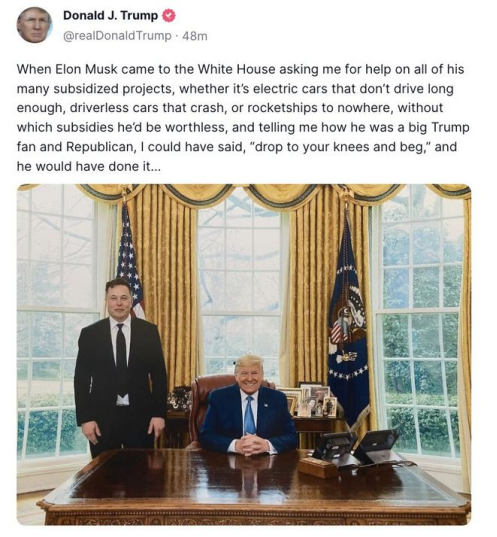
There are no eternal enemies in the adult world. In less than two years, the two have returned to their honeymoon period. When asked about the reason, Musk once responded in an interview that he supports Trump because the current political views and values of the Democratic Party do not match his own, and the Democratic Party's indulgence of racial diversity has accelerated the division of the United States. Judging from Musk's own characteristics of populism and political strongman worship, this statement is reasonable, but it is obviously not enough to make a 180-degree turn based on ideas alone. The core reason is nothing more than one thing - interests.
Let's start with the core of the change in Musk's relationship with the Democratic Party. Musk initially supported Biden because of his promise to vigorously develop clean energy and support the development of electric vehicles. Development is development, but the Biden administration seems to deliberately exclude Tesla. In August 2021, the Biden administration organized an electric vehicle summit and signed an executive order at the event, with the goal of half of all new cars sold in the United States being zero-emission vehicles by 2030. Interestingly, General Motors, Ford Motor and Stellantis were invited to this event, but the largest electric car giant Tesla was not invited. The reason at the time was due to the pressure on the Biden party from the United Auto Workers, a long-time ally of the Democratic Party.
The rift arose from this, and as his companies continued to develop, Musk's conflicts with the government intensified due to issues such as wealth tax on the rich, anti-union forces, and corporate regulatory policies. During Biden's term, Musk's companies such as Tesla and SpaceX became the targets of at least 20 regulatory investigations or reviews, which added fuel to the fire in the relationship between the two.
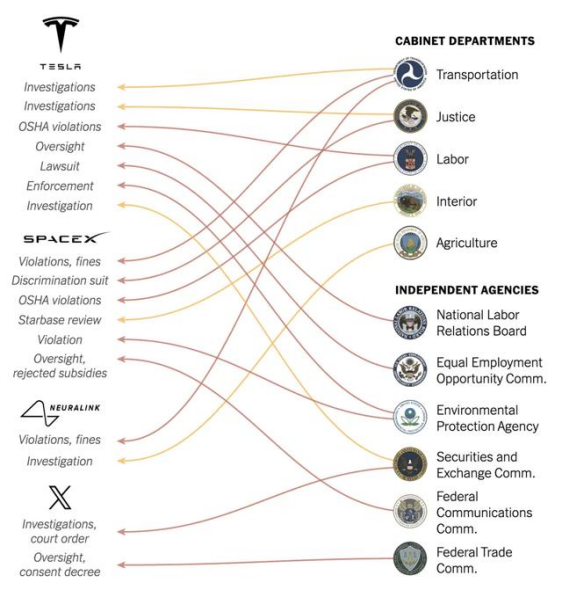
Musk's companies are being scrutinized by multiple U.S. regulators. Source: The New York Times
On the other hand, taking SpaceX as an example, according to statistics from the New York Times, last year SpaceX signed nearly 100 different contracts with 17 US federal agencies and obtained $3 billion in funding commitments. The government has become SpaceX's largest funder.
But just last month, the Federal Aviation Administration (FAA) initiated a $633,009 fine against SpaceX because the company violated licensing requirements and endangered safety in two launches in Florida last year. In the recent test flight of the Starship, the FAA also delayed the test flight for several weeks on the grounds of suspected endangerment of wildlife. Not long ago, the US Department of Justice sued SpaceX again, claiming that the company refused to employ refugees and asylum seekers due to citizenship.
In addition to regulation, subsidies are no longer so easy to obtain. The Federal Communications Commission (FCC), which is responsible for regulating SpaceX's launch of Internet satellites, revoked SpaceX's application for $886 million in federal funds to provide Internet access to rural areas because it provided services in non-rural areas.
Tesla is no exception. The National Highway Traffic Safety Administration has opened five investigations into Tesla, including complaints of unexpected braking, loss of steering control and crashes in "autopilot" mode.
Musk has long been resentful of this, believing that he has been politically persecuted. In 2012, he denounced US regulators as bastards. His personal life also played a key role in this. Musk's son's gender reassignment also made him think that the Democratic Party's ideology was too radical. It was this fuse that led Musk to break with California and subsequently acquire Twitter. After various events, Musk gradually threw himself into the arms of the Republican Party and officially supported Trump on July 13 this year.
03. Behind the support, the undercurrent of money and power transactions is surging
Supporting Trump is naturally due to the promises made by the two.
It is worth noting that although Trump's attitude softened after forming an alliance with Musk and he said he would support electric vehicles, he was not a fan of electric vehicles before that. Influenced by this, liberals who are keen on environmental protection have begun to boycott Tesla. According to data from the California New Car Dealers Association, Tesla's sales in California, where liberals are concentrated and the largest electric vehicle market in the United States, fell 17% in the second quarter.
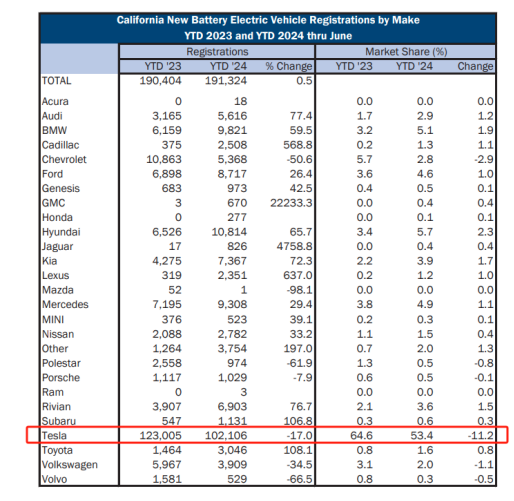
So what did Trump promise that made Musk take such great risks and insist on taking action?
A government efficiency department has thus surfaced. As early as August 12, Trump mentioned in a conversation with Musk that if he was elected president, Musk might get a position in his government. A few days later, Musk posted an AI-generated picture on X, which read the Department of Government Efficiency, but at that time the market mostly thought it was just a MEME spread.
On September 5, Trump mentioned this position again, saying that he would adopt Musk's suggestion and formally establish a "Government Efficiency Committee" led by the latter. Trump did not explain the operation of the committee in detail, but only said that after its establishment, the committee will be responsible for "conducting a comprehensive financial and performance audit of the entire federal government" and making recommendations on reforms to reduce government spending. On October 18, Musk also disclosed this plan, saying that the department will operate like a company, improve the efficiency of the government's use of taxpayer funds, and streamline the departments responsible for spending.
It seems that introducing external experts will enhance transparency and improve funding efficiency, and the final expenditure still needs to be approved by Congress. Considering Musk's past record of cost-saving, it is quite appropriate. However, if you look closely at this function, all federal government projects must be cut upon his recommendation. He may also have the function of reducing redundant procedures. In fact, he has already assumed the "supervision" of the regulatory authorities in disguise. As a federal project contractor who has long received high subsidies, Musk is very likely to have collusion of interests.
For example, SpaceX once mentioned in a statement that "the paperwork required to obtain government approval for rocket launches takes longer than the time required to design and build the actual hardware." In this case, is the so-called efficiency department qualified to "suggest" streamlining the regulations? Furthermore, does Musk have the ability to cut the contract expenses of his competitors and the government so that his own company can get more benefits?
Of course, the operation mode of the committee has not been revealed, but it is certain that the conflict of interest contained therein is already undercurrent. As for why Trump chose Musk, it is also easy to understand. In his last term, Trump was still a fledgling political rookie. Although Hillary Clinton's explosion at a critical moment caused the establishment to turn to Trump for self-protection, in the subsequent administration, Trump's crude America First concept made the highly rentier globalized establishment quickly distance itself from him, which greatly affected the efficiency of administration in the future.
This year, Trump also learned his lesson and began to cultivate a party that is more suitable for him. He chose Pence, who is younger and easier to control, as the vice presidential candidate. It is understandable that he chose Musk, who has a similar personality, significant influence and is also a businessman. The same is true for Musk's opposition to him. In the Democratic Party, which is deeply rooted and has been coldly received, it is difficult for Musk to get a big job. But on the side of Trump, who is relatively new, the importance is very different, and he is more likely to go further in his political career. The two hit it off, and in the eyes of the market, it has turned from "fighting" to "honeymoon".
But the sweet relationship between the two is a strong threat to the other party. Musk has mentioned more than once in public that he does not want to get involved in politics. This is a last resort, otherwise the Democratic Party will threaten his personal safety after coming to power. He even mentioned that the possibility of his assassination has greatly increased. Whether Musk, who has acquired public opinion platforms and has taken sides, really has no intention of being in politics is beyond comment, but the prison disaster caused by failure is very likely to exist. If it comes to this, SpaceX, Tesla, Neuralink, X and other business platforms that Musk is proud of will also be widely affected. In this sense, Musk's emphasis on assassination in public everywhere is obviously intended to make the Democratic Party cautious, and perhaps this is also one of the important means to protect itself.
It is worth mentioning that Musk, who is worth $250 billion, does not have a large amount of cash flow. Stock assets are his core wealth. Tesla stock accounts for 60% of Musk's net worth. Therefore, election donations and subsequent promotions are not an easy expense even for Musk.
Ultimately, the reason why so much manpower and resources are spent is that Musk has already made a desperate move in this election.
Fortunately, Trump is currently doing very well. Although the latest polls show that Harris' 46% approval rating is slightly higher than Trump's 43%, Trump's approval rating has clearly rebounded in swing states. As of October 21, polls show that Trump is already ahead in 8 of the 9 swing states. In the gambling market, Trump's winning rate has reached 57.9%, far exceeding Harris' 40.8%, and the crypto prediction market is far ahead of Harris by about 30 percentage points. If everything goes according to the data, it may only be a matter of time before Trump takes office. In response, the crypto market also followed suit, with BTC breaking through $66,000, and DOGE also taking advantage of the trend.
Of course, it’s still a long way to go and it’s hard to predict whether it will be a blessing or a curse, but what’s certain is that Musk and Trump, the two brothers with similar interests, have been tightly tied to the same boat.













